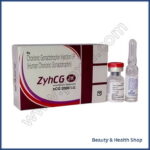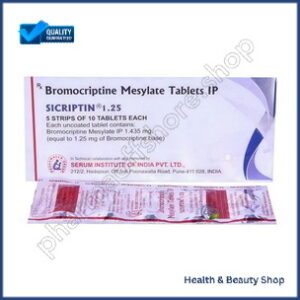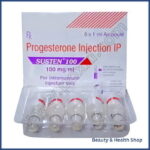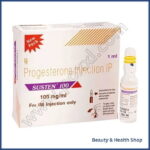ADDICTION
ALCOHOL DEPENDENCE
QUIT SMOKING
ALLERGY
ANTI FUNGAL
FUNGAL INFECTION
FUNGAL NAIL INFECTIONS
ANTI-REJECTION DRUGS
ANTI WORM
ANTIBIOTIC
BACTERIAL INFECTIONS
ARTHRITIS
GOUT
OSTEOARTHRITIS
RHEUMATOID ARTHRITIS
BLOOD
LOW PLATELET COUNT
THROMBOPHLEBITIS
VARICOSE VEINS
COLON
ANAL FISSURE
PILES
ULCERATIVE COLITIS
DIABETES CARE
DIABETES INSIPIDUS
DIABETES TYPE
DIABETIC FOOT ULCERS
GLUCOSE MONITOR
EYES/EAR CARE
DRY EYES
EYE CARE
EYE EXAMINATION
EYE INFECTION
EYE LASHES
EYE PAIN
GLAUCOMA
OCULAR HYPERTENSION
UVEITIS
FEVER CARE
MALARIA
RHEUMATIC FEVER
TYPHOID FEVER
GASTROINTESTINAL
ACIDITY
CONSTIPATION
CROHN'S DISEASE
DIARRHOEA
GALLBLADDER STONES
INTESTINAL ULCERS
IRRITABLE BOWEL SYNDROME
MOTION SICKNESS
NAUSEA
Zyhcg Hcg (Human Chorionic Gonadotropin)
Zyhcg 10000 (Hcg 10000Iu)
Zyhcg 2000 (Hcg 2000Iu)
Zyhcg 5000 (Hcg 5000Iu)
| Active Ingredient (Generic Name): | HCG (Human Chorionic Gonadotropin) |
|---|---|
| Indication: | Female infertility |
| Manufacturer | German Remedies Private Ltd |
| Packaging: | 1 Vial in Box |
From: $75.00
Human Chorionic Gonadotropin (HCG), also known as Zyhcg Hcg, is a hormone produced during pregnancy that plays a vital role in regulating physiological processes, particularly in the reproductive system. Structurally similar to LH, FSH, and TSH, HCG mimics LH actions, impacting hormonal balance. It is crucial for maintaining hormonal homeostasis, supporting early embryo development, ensuring pregnancy viability, and stimulating progesterone production. Beyond pregnancy, HCG has applications in infertility treatment, weight loss, and hormone regulation. Exploring the multifaceted functions and potential benefits of HCG can provide insights into its impact on overall health and well-being.
Main Points
- Zyhcg Hcg is a glycoprotein hormone that plays a key role in regulating reproductive processes and maintaining hormonal balance, particularly during pregnancy.
- During pregnancy, HCG supports embryo development, sustains pregnancy viability, and stimulates progesterone production to support the uterine lining.
- HCG therapy is utilized in infertility treatment to address hormonal imbalances and can be combined with procedures such as IVF, IUI, and third-party assisted reproduction.
- The efficacy of HCG injections for weight loss when combined with a very low-calorie diet is not well-supported by scientific evidence, and potential risks include electrolyte imbalances and nutrient deficiencies.
- Possible side effects of HCG treatment may include headaches and fatigue, with the potential for severe complications such as OHSS, underscoring the importance of careful consideration.
What Is Zyhcg Hcg?
Zyhcg Hcg, also known as Human Chorionic Gonadotropin, is a glycoprotein hormone produced by the syncytiotrophoblast, a component of the placenta. It plays a crucial role in regulating various physiological processes, particularly in the reproductive system. Structurally similar to luteinizing hormone (LH), follicle-stimulating hormone (FSH), and thyroid-stimulating hormone (TSH), Zyhcg Hcg mimics LH’s actions, stimulating the production of androgens and estrogens. This affects the body’s hormonal balance. Zyhcg Hcg is vital for maintaining hormonal homeostasis and reproductive health. Dysregulation of this hormone can have significant consequences, highlighting its importance in the intricate mechanisms of the human hormonal system.
HCG’s Role in Pregnancy
HCG plays a crucial role in pregnancy by regulating hormones, supporting early embryo development, and maintaining pregnancy viability. These functions are essential for a healthy pregnancy, making HCG presence pivotal during this time. Understanding these key aspects provides insight into the significance of HCG in pregnancy.
Hormone Regulation
During pregnancy, human chorionic gonadotropin (hCG) is crucial for regulating hormone levels, especially progesterone, to support fetal growth and maintain a healthy pregnancy. hCG stimulates the corpus luteum in the ovary to produce progesterone, which is vital for sustaining the uterine lining for the embryo. As the pregnancy advances, the placenta takes over progesterone production under hCG’s regulation. This delicate hormone balance is essential for a successful pregnancy. Any dysregulation of hCG can lead to complications. Understanding hCG’s role in hormone regulation provides insight into the intricate processes of pregnancy.
Early Embryo Development
During the blastocyst stage, human chorionic gonadotropin (hCG) is crucial for early embryo development as it promotes embryonic implantation and maintains uterine receptivity. hCG stimulates progesterone production, enhances uterine blood flow, inhibits the mother’s immune system, and regulates gene expression for embryonic development and implantation.
Maintaining Pregnancy Viability
Human chorionic gonadotropin (hCG) is vital for maintaining pregnancy viability by regulating key physiological processes necessary for fetal development and maternal adaptation. hCG prompts the corpus luteum to produce progesterone, crucial for sustaining the uterine lining and aiding embryonic implantation. It also oversees placental development, ensuring efficient exchange of oxygen and nutrients between mother and fetus. Furthermore, hCG facilitates the differentiation of fetal tissues and organs, supporting the formation of major systems in the developing baby. Additionally, hCG modulates the immune system to prevent rejection of the fetus as foreign. Monitoring hCG levels throughout pregnancy is essential for creating an optimal nurturing environment for the growing fetus and ensuring a healthy pregnancy outcome.
Infertility Treatment Options
When considering infertility treatment options, it’s essential to understand the causes, which can vary from hormonal imbalances to anatomical issues. Evaluating treatments like in vitro fertilization (IVF) and intracytoplasmic sperm injection (ICSI) is necessary to choose the best approach for your specific situation.
Causes of Infertility
Infertility can be caused by various factors, including hormonal imbalances like polycystic ovary syndrome (PCOS) or thyroid disorders, anatomical issues such as blocked fallopian tubes or uterine fibroids, lifestyle choices including obesity, smoking, or excessive alcohol consumption, and age-related fertility decline in both men and women. Identifying the specific cause of infertility is crucial for developing a personalized treatment plan with your healthcare provider to improve your chances of a successful pregnancy.
Treatment Alternatives
Various infertility treatment options are available to assist in overcoming obstacles and achieving a successful pregnancy. If struggling with infertility, individuals can explore alternatives like medications such as Clomid and Femara to stimulate ovulation. In vitro fertilization (IVF) involves the combination of eggs and sperm in a laboratory before transferring resulting embryos to the uterus. Intrauterine insemination (IUI) is another option where sperm is directly inserted into the uterus.
Third-party assisted reproduction, such as egg or sperm donation, or surrogacy, may also be considered. For male factor infertility, partners may benefit from intracytoplasmic sperm injection (ICSI), where a single healthy sperm is injected into an egg. It is important to discuss costs, success rates, and potential risks with a healthcare provider to make an informed decision on the most suitable treatment option. Understanding these alternatives will help in selecting the right path to address infertility concerns.
Weight Loss and HCG Injections
HCG injections are often promoted as a weight loss solution, claiming to aid in significant fat reduction when combined with a very low-calorie diet. The HCG diet involves daily injections of HCG along with a highly restricted calorie intake. Advocates suggest that HCG can decrease hunger and enhance fat loss, particularly in stubborn areas like the abdomen and thighs.
However, it is crucial to approach these assertions with skepticism. While some individuals have reported notable weight loss on the HCG diet, there is limited scientific evidence to substantiate its efficacy. Many experts view the HCG diet as a passing trend with potential risks, such as electrolyte imbalances due to extreme calorie limitation, nutrient deficiencies from insufficient food consumption, possible interactions with specific medications, and challenges in maintaining long-term weight loss.
Before embarking on any weight loss regimen, especially one involving injectable substances like HCG, consulting with a healthcare provider is essential.
How HCG Works in Body
When introduced into the body, HCG initiates a series of biochemical reactions that impact hormone regulation, metabolism, and energy production. This hormone, originating from the placenta during pregnancy, plays a crucial role in governing various physiological processes. Upon binding to receptors in the hypothalamus, HCG prompts the release of stored fat into the bloodstream, boosting metabolic rate and enhancing fat burning efficiency.
HCG’s interaction with the hypothalamus also influences the balance of other hormones like leptin and insulin, crucial for appetite and satiety regulation. Additionally, HCG helps curb cravings for unhealthy foods by affecting the hypothalamus, facilitating adherence to a healthier diet. Understanding the mechanisms of HCG in the body sheds light on its potential as a tool for weight loss and overall health enhancement.
Benefits of HCG Therapy
Undergoing HCG therapy can result in improved weight loss, enhanced fat-burning efficiency, hormone level regulation, and increased energy levels. These benefits can contribute to a more balanced and vibrant state of health and well-being.
Weight Loss Boost
Incorporating HCG therapy into your weight loss plan can enhance fat burning and metabolism, facilitating a more efficient weight loss journey. HCG prompts the hypothalamus in the brain, which controls hunger and fullness, to release stored fat into the bloodstream. This triggers the body to utilize fat for energy, resulting in steady and sustainable weight loss.
Key benefits of HCG therapy for weight loss include increased fat breakdown, improved metabolic rate, appetite regulation, and boosted energy levels.
Hormone Regulation
HCG therapy plays a role in regulating hormone levels, aiding in the correction of hormonal imbalances that can impede weight loss efforts. This regulation can promote a more balanced and healthy body composition. By stimulating hormone production, HCG therapy assists in restoring equilibrium to hormone levels, potentially leading to enhanced overall health and well-being. Balanced hormones may result in increased energy, better mood, and improved cognitive function. Furthermore, optimal hormone levels can contribute to better sleep quality, reduced inflammation, and strengthened immune function.
Throughout HCG therapy, a decrease in cortisol levels may be observed, potentially reducing feelings of anxiety and stress. Simultaneously, an increase in testosterone production could occur, potentially enhancing libido and overall energy levels. Through hormone regulation, HCG therapy aims to support a balanced and healthy body composition, fostering sustainable success in weight loss endeavors.
Energy Level Enhancement
One of the key advantages of HCG therapy is the potential increase in energy levels it can provide. HCG stimulates testosterone production, a hormone essential for energy generation. Optimal testosterone levels can result in heightened energy, motivation, and focus.
Throughout HCG therapy, individuals may experience enhanced overall energy levels, enabling them to approach daily tasks with greater enthusiasm and vigor. Here are some ways HCG therapy can boost energy levels:
- Increased ATP production: HCG prompts the generation of ATP, the cellular energy source.
- Enhanced mitochondrial function: HCG aids in improving mitochondrial efficiency, the cell’s energy-producing organelles.
- Reduced fatigue: By enhancing energy production, HCG therapy may help alleviate fatigue and lethargy.
- Improved mental clarity: Elevated energy levels from HCG therapy can lead to enhanced mental clarity, focus, and concentration.
Risks and Side Effects
When undergoing Zyhcg Hcg treatment, you may experience various side effects that can affect your health. These can range from mild issues like headaches and fatigue to more severe complications such as ovarian hyperstimulation syndrome (OHSS), which can be life-threatening. Symptoms of OHSS include abdominal pain, nausea, vomiting, and shortness of breath. Additionally, there is a risk of developing blood clots, stroke, or heart attack, especially if you have a history of cardiovascular disease or clotting disorders. It is crucial to discuss your medical background with your healthcare provider before starting Zyhcg Hcg treatment to address any concerns and minimize potential risks.
HCG Injections Vs. Oral Supplements
When considering Zyhcg Hcg treatment, you can choose between injections or oral supplements. Injections deliver HCG directly into the bloodstream for faster results, but may lead to skin issues. Oral supplements are easier to take but may have lower effectiveness. Factors to consider include convenience, efficacy, side effects, and cost.
Common Misconceptions Debunked
Understanding Zyhcg Hcg treatment is crucial for making informed decisions about this weight loss solution. It is a common misconception that HCG is only effective for women, but in reality, both men and women can benefit from this hormone. While HCG is naturally produced during pregnancy, its weight loss advantages are not limited by gender.
Another myth is that HCG offers a quick and effortless solution for weight loss. In truth, HCG is most successful when combined with a balanced diet and regular physical activity. It is not a miraculous cure, but rather a supportive tool for your weight loss efforts.
Real-Life Success Stories
Individuals struggling with weight loss often find motivation in hearing about others who have successfully shed pounds with HCG treatment. Here are a few real-life success stories:
- Sarah lost 20 pounds in 30 days with HCG and maintained her weight loss.
- John lost 15% body fat in 6 weeks, noting increased energy and better overall health.
- Emily lost 30 pounds on HCG and has kept it off for over a year.
- Michael felt more confident after losing 25 pounds on HCG and easily maintained his weight loss.
These examples show how HCG can help achieve weight loss goals and improve overall health.
Frequently Asked Questions
Can I Use HCG if I’m Breastfeeding or Pregnant?
It is important to prioritize your well-being and that of your child when considering using HCG, especially if you are breastfeeding or pregnant. HCG has the potential to stimulate ovarian follicle growth, which may not be advisable during these conditions. If you are breastfeeding or pregnant, it is essential to consult your healthcare provider before using HCG. They will assess the potential benefits against the possible risks to your health and your baby’s health. Ensuring the safety and well-being of yourself and your child is paramount during this time.
Is HCG Approved by the FDA for Weight Loss?
HCG is not approved by the FDA for weight loss. The FDA has stated that HCG has not been proven effective in treating obesity and warns against its use for weight loss. Products claiming otherwise should be approached with caution, as they may be deceptive or fraudulent.
Can I Take HCG With Other Medications or Supplements?
When combining HCG with other medications or supplements, it is important to proceed with caution. Consult your healthcare provider to ensure safe interactions. Medications like blood thinners or diabetes medications may interact with HCG. Similarly, supplements such as blood sugar regulators or blood pressure medications could also have interactions. Disclose all medications and supplements to your healthcare provider to prevent potential complications.
How Long Does It Take to See Results From HCG Therapy?
Results from HCG therapy can be observed within the first week, with significant improvements noticeable by week three. Increased energy, improved mood, and enhanced weight loss are common effects as your body adjusts to the treatment. By week six, you are likely to see noticeable changes in body composition and overall well-being.
Is HCG Suitable for People With Thyroid Disorders?
Before starting HCG therapy, it is essential to consult a healthcare professional, especially if you have a thyroid disorder. While HCG can be used alongside thyroid medication, it is crucial to seek guidance from a healthcare provider. They will assist in determining the most suitable treatment plan, as HCG could potentially interact with specific thyroid medications or exacerbate existing thyroid conditions.
Conclusion
You have acquired a comprehensive understanding of zyhcg hcg, its role in pregnancy, and its applications in infertility treatment and weight loss. You are familiar with the mechanism of action of hcg in the body, potential risks and side effects, and the distinctions between injections and oral supplements. By dispelling common misconceptions, you can make well-informed decisions regarding the use of hcg for your specific requirements.



















